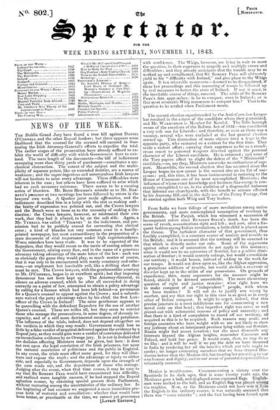NEWS OF THE WEEK.
THE Dublin Grand Jury have found a true bill against DANIEL O'CoNrizu. and the other Repeal leaders; but there appears some likelihood that the counsel for the accused will succeed in frus- trating the Irish Attorney-General's efforts to expedite the trial. The earlier stages of the prosecution have already sufficed to ex- hibit the world of difficulty with which Government have to con- tend. The mere length of the documents—the bill of indictment occupying more than thirty yards of parchment—constitutes a me- chanical obstruction. The extent of the subject and the multi- plicity of separate points, like an extended frontier, are a source of weakness ; and the super-ingenious and unscrupulous Irish lawyers will not hesitate to seize every advantage. These difficulties were inherent in the case ; but others have been suffered to arise which had no such necessary existence. There seems to be a running series of blunders. Mr. BOND HUGHES'S mistake as to Mr. BAB- /LETT'S presence at two meetings has been followed by errors in the lawyers' own work. A Quaker juror made affirmation, and the indictment described him in a lump with the rest as making oath : the laxity of expression was pointed out, and the Crown lawyers and the Bench were at issue as to the necessity of making a dis- tinction: the Crown lawyers, however, so mistrusted their own work, that they had it altered, to be on the safe side. Again, a Mr. TYRRELL was called " TIERNEY " in the indictment, and per- mission had to be publicly craved for correcting that clerical error ; a kind of blunder not very common even in a hastily- printed newspaper, but most extraordinary in the preparation of a state document of vital importance under high superintendence. Worse mistakes have been made. It was to be expected of the Repealers, that they would resort to the tactic of casting odium on the Government, seizing every flaw, and in the name of a generous advocacy taking advantage of the mere letter of the law : such was so obviously the game they would play, so much matter of course, that it was only to be encountered with manly constancy and calm- ness,—an unpleasant but inevitable evil, like a drifting sleet that must be met. The Crown lawyers, with the gentlemanlike courtesy to Mr. O'CONNELL, began in an excellent spirit; but that imposing demeanour has not been kept up. The Attorney-General, to silence an adverse counsel, which he after all succeeded in doing correctly on a point of law, attempted to obtain a paltry advantage by calling for a licence which had been left behind—a permission for a Queen's counsel to appear against the Crown ; and a subordi- nate waived the petty advantage taken by his chief, the first Law- officer of the Crown in Ireland! The same gentleman appears to be quarrelling with the defendant Repealers for the use of another Queen's counsel. These are trifles all, but they seem to convict those who manage the prosecutions, in some degree, of slovenly in- capacity, and of a still more detrimental meanness and petulance. The influence of the trials, indeed, does not depend altogether on the verdicts in which they may result : Government would lose as httle by a false verdict of acquittal delivered against the evidence by a Repeal jury, as they would gain were a verdict of conviction delivered on inconclusive evidence by an Orange jury. It is not in Ireland that the decision affecting Ministers must be given, but here : it does not rest upon the legal conviction of the Irish prisoners, but upon the rational conviction of politicians and the public in England. In any event, the trials must effect some good, for they will illus- trate and expose the truth ; and the advantage or injury to either side, and especially to Government, depends upon the strength of the case made out, and the deportment of those who manage. Judging after the event, when that time comes, it may be easy to say that Sir ROBERT PEEL would have encountered less difficulty, and realized more tangible success, if he had stopped the Repeal agitation sooner, by obtaining special powers from Parliament, without venturing among the uncertainties of the ordinary law. In the beginning of last summer we suggested a more immediate pro- cess botb of restraint and conciliation : whether that would have been better, pr practicable at the time, we cannot yet pronounce with confidence. The Whigs, however, are lying in wait to moot the question, in their eagerness to magnify and multiply errors and difficulties ; and they already anticipate that the trouble may be so worked up and complicated, that Sir ROBERT PEEL will ultimately yield to his " difficulty with Ireland," and give place to the Whigs again. It is a miserable manceuvre— doomed to be disappointed, if these law proceedings and this mustering of troops be followed up by real measures to better the state of Ireland. If not, it must, in the inevitable course of things, succeed. The crisis of Sir ROBERT PEEL'S fate approaches: is lie to conquer, even in Ireland ; or is that most miserable Whig manceuvre to conquer him ? That is the question to be settled when Parliament meets.


























